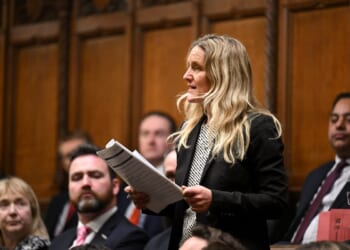Kemi Badenoch can be a political ideologue – and if you don’t buy into what she sees as obvious, say, that issues with chlorinated chicken are overblown, then you can’t have seen the light.
Even before Trump told Britain yesterday to buy chlorinated chicken in order to receive lower tariffs, Badenoch – when asked what the United Kingdom should be prepared to sacrifice in a trade deal with the United States – said earlier in the week that “I don’t even think most chicken in the US is actually washed with chlorine – it’s a myth that has expanded quite a lot over the years” and “it is not true that the sticking points [to a UK-US trade deal] have been hormone-fed beef etc, this is what gets whipped up in the press and by campaign groups”.
It was a dismissive sounding answer that appears at odds with the attitudes of her own shadow defra team, and a potential row is brewing.
Shadow environment secretary Victoria Atkins only four months ago said: “We as Conservatives are proud of the fact that we would not enter trade deals that require the flooding to these shores of chlorinated chicken or hormone-treated beef.”
Shadow defra minister and trained vet Dr Neil Hudson made many similar contributions throughout the last parliament, including saying “rightly those practices [hormone-treated beef and chlorine-washed chicken] are banned in this country …so those products will not be imported”.
Shadow farming minister Robbie Moore even just this week posted a bold graphic accusing Reform UK of a “chlorinated chicken sell-out” that “betrays British farmers” after Nigel Farage suggested the issue of chlorinated chicken in the UK could be sorted via labelling to “let consumers decide”.
Moore added: “Chicken is chlorinated because of the lower standard of welfare and farming practices it conceals. I don’t want that in our country.”
They are views shared by the deputy chief whip Joy Morrissey back in 2020: “I am grateful that chlorinated chicken will not grace these shores.”
Party co-chairman Nigel Huddleston in 2022 on the Australia and New Zealand trade deal: “We are proud of our high animal welfare and food safety standards, which is why… no new permissions for imports such as hormone-treated beef were granted.”
Even at one time Badenoch touched on it herself as business secretary in 2023, when in a written statement on CPTPP, she said: “We have kept our word and not allowed our food standards to be up for negotiation. Neither hormone-fed beef or chlorinated chicken will be permitted in the UK.”
When the issue reared its head back in 2020, with an amendment to the Agriculture Bill from Simon Hoare and Neil Parish that would have guaranteed a ban on chlorinated chicken and hormone-fed beef (yes, the MP Neil Parish who was later caught watching pornography in the Commons chamber), the Tory government struggled with double-figure rebellions and resorted to one-on-one briefings with its uncertain MPs to eventually defeat the amendment with a majority of just 51.
It prompted the Mail on Sunday to launch what proved to be a popular campaign with the National Farmers’ Union, backed by television-chef Jamie Oliver, to protect British food standards from “inferior foreign imports”, receiving nearly 750,000 signatures on its petition.
“It’s not a food safety concern, it’s animal welfare,” a Tory source tells me. “They [the US] keep the chickens in really bad conditions so they have to wash them.”
Environment secretary at the time George Eustice says: “We didn’t leave the EU and become a self-governing nation again just to allow a different country to dictate our laws. The US is very backward when it comes to animal welfare regulations in particular.”
He flags that in the US, the Supreme Court upheld a law in California (Proposition 12) that allowed the state to impose bans on certain agricultural food goods from other US states that didn’t match Californian law on welfare.
“If California bans meat produced by cruel methods, why shouldn’t the UK with its long tradition of legislative leadership on animal welfare?”
If it were to become Badenoch’s policy to back chlorinated chicken, he adds: “I would imagine there would be quite a lot that would just rebel on this.”
“We need to ground this in fact and not in scaremongering,” one LOTO insider tells me, “chlorinated chicken is a bit of a myth, that’s true… the [chlorine-dioxide] solution is so watered down it is probably no more chlorinated than the water that we drink”.
“What Kemi said is completely true. This is a moral panic.”
The dispute between the EU/UK and the US over chlorinated chicken is long-standing.
One of the EU’s key concerns is that the use of antimicrobial treatments, like chlorine washes, compensates for poor hygiene elsewhere in the supply chain and allows processors an easy-fix get-out of better treatment.
The US disputes this as not being based on scientific evidence and little more than protectionism to protect poultry producers from competitive imports.
“What people claim is that they only have to do this in the US because their conditions are so terrible that the chickens are basically reared in their own shit, and that’s why they have to do this extra rinse. I’m afraid that’s not true. I wish I could tell you that British chickens are raised in luxury and cleanliness but that’s just not the case,” the LOTO insider adds.
They argue that a like-by-like comparison of rules for mass rearing poultry for retail consumption are “almost identical” between the UK and US – and are hopeful that fellow Tories will wake up to what they see as the plain reality.
“Our farmers have very successfully created this idea that British chickens are reared in these clean and humane conditions, and this farm-to-fork hygiene situation where we don’t need to use these chemical procedures at the end. It is successful marketing and successful protectionism.”
But if turned into a party position, LOTO may find it extremely difficult to temper Tory rebellions. One senior MP says: “If they want me to vote for chlorinated chicken, they can dream on: my farmers would go apeshit!”
They tell me that it leaves room for the Liberal Democrats to take on the farming cause, concerned that they may put the Tory leader’s comments on future Lib Dem leaflets after having already lost swathes of rural seats to the party.
Another MP questions why Badenoch had to wade into the chlorinated aspect of the debate, and could have instead simply made clear that she’d be doing whatever she could to get the best deal for British farmers.
They add: “We’ve put so much political capital into getting farmers on side with inheritance tax. It is a campaign that has done really well. Why do we want them to turn on us by doing this? It just seems a really silly thing to do politically.”
It speaks to a problem often flagged by Tory colleagues of Badenoch’s: a desire for the ideological over the political. And it does not seem to be one that is going away.
Backbencher Simon Hoare was already out of the gates, trying to get a PMQ this week to “urge the Prime Minister not to deliver another hammer blow” to farmers by “bending the knee to a tariff and quota free chlorine chicken and hormone beef trade deal”. It is unlikely he’d change his mind if it were his own Tory leader pushing the same.





![Trump's Admin Guts Another ‘Rogue Government Agency with Zero Accountability’ [WATCH]](https://www.right2024.com/wp-content/uploads/2025/03/Trumps-Admin-Guts-Another-‘Rogue-Government-Agency-with-Zero-Accountability-350x250.jpg)



![‘We All Owe Him (Elon) a Huge Debt of Gratitude’ [WATCH]](https://www.right2024.com/wp-content/uploads/2025/03/‘We-All-Owe-Him-Elon-a-Huge-Debt-of-Gratitude-350x250.jpg)







